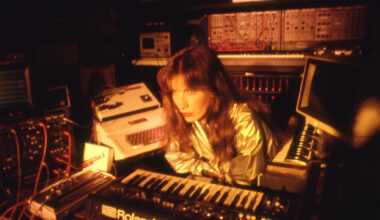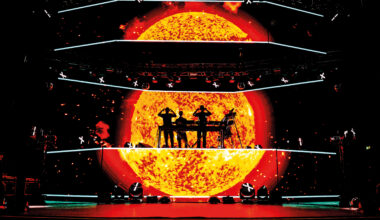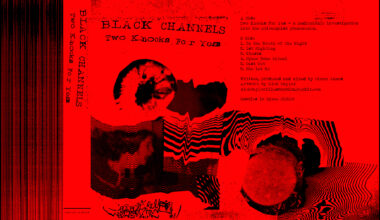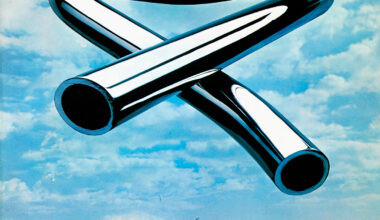One of them is French and best known as half of Air. The other is Icelandic and made a name for himself with Bang Gang. Together they are Starwalker and they’re lighting up the night sky with their twinkling electropop songs
“When there is too much beauty, it becomes too clean. We prefer dirty beauty to pure beauty.”
So says Jean-Benoît Dunckel, one half of the hallowed French duo Air, who first ascended in the late 1990s on a quite unexpected wave of Gallic creativity that also encompassed the ingenious tech-house of Daft Punk and the blue-eyed soul of Phoenix. Air’s weightless retro-futurist pop, as evidenced on their ‘Moon Safari’ debut album, was the perfect soundtrack for those woozy, uncertain times, dazed by trip hop and anticipating the post-space age of the 21st century.
Dunckel and his Icelandic pal Barði Jóhannsson (from Bang Gang and Lady & Bird) are Starwalker, whose 2014 ‘Losers Can Win’ EP earned much praise for stretching notional bubblegum pop music to cinematic dimensions. Now Starwalker have released an eponymous album which sees them “explore a universe together”, as Dunckel puts it, drawing on the Air man’s synth sensibilities and robotically plaintive, vocoderised vocals and Jóhannsson’s skills as a composer and pop sculptor.
“When we started working together, we connected, we found a nice presence,” says Jóhannsson of the pair’s initial recordings, which followed a chance meeting at a festival. “After so many years of working with different people, I think it’s important that the first impression, the number one thing, is that you like someone, and then you see if you can work together making music. When we did that, something happened. It was as if we triggered something in each other.”
‘Starwalker’ is an album of myriad, deceptive pleasures. ‘Holidays’ is all cartoon sunbeams and a calculatedly inane vocal – “The sun is bright and I feel alright” – giving way to genuinely warming waves of synth-soaked, reverberating pop. ‘Blue Hawaii’ is faintly reminiscent of the sort of deep azure mood favoured by The Associates; a pleasure dome, but a place for rumination, not necessarily relaxation: “You want to change the world / But the world can only change you”.
‘Radio’ is a lovely reminder of Air contemporaries Phoenix and is in the tradition of countless musical tributes, from Kraftwerk to Rush, to the medium’s favourite medium. By the time of ‘President’ and ‘Bad Weather’, the initially blue skies have developed into something very interesting indeed; the “dirty beauty” to which Dunckel refers.
“It’s also emotional,” says Jóhannsson. “It’s got everything.”
Air dropped into a fairly untroubled world, the relatively tranquil pre-millennial era. I wonder how they feel Starwalker sits in today’s more fraught and darkened times?
“When you’re in Iceland, maybe the rest of the world is darker, but it’s pretty nice here,” laughs Jóhannsson. “We don’t have an army, we just have the Salvation Army, that’s the only army we have.”
Well, they did jail their corrupt bankers, at least.
Jean-Benoît Dunckel and Barði Jóhannsson represent two countries generally believed to have no modern musical histories before Daft Punk and Björk respectively, despite being major global hubs today. But both France and Iceland have deeper national pop traditions than is often assumed.
“There is great 70s music from Iceland, psychedelic bands like Trúbrot, for example,” says Jóhannsson. “But I think Björk and The Sugarcubes unlocked the door for a lot of indie bands, showing them there was a possibility for them to make it. When I was 20 years old and starting to make music, there was no radio station that would play my stuff. But this freed me. It meant I felt I could play whatever I wanted, since there was no chance that radio would play it. But then accidentally that music did end up on the radio.”

When I interviewed Dunckel with his Air partner Nicolas Godin way back when, they played me a number of French albums from the 1960s and 1970s; immaculate, filmic, chic pop, none of which I had come across before. This was their musical hinterland, submerged from international sight.
“Yes, of course, this music is from when I was a small child,” says Dunckel. “You’re right, this music didn’t cross the border because of the language barrier. I’m not just thinking of Serge Gainsbourg, but also artists like François De Roubaix, a film score composer who used synthesisers and drum machines in the 60s and 70s [and who sadly died in a diving accident in 1975].”
If French pop was once invisible to the wider world, it’s interesting that Daft Punk chose to hide their faces when they went global, a tactic that Dunckel understands.
“I don’t mind not being them!” he says. “It’s good not to be over-exposed. I like Air remaining a little in the shadows, for the music to be well known, but for the people who make it to be a little mysterious.”
He adds that he finds the process of interviews irksome, particularly television interviews, a medium with a facade of showbiz politesse.
“Sometimes I am tempted to answer questions with really horrible things, not politically correct things.”
Jóhannsson shares this disdain but comes from a very different background, having tried his hand at TV with a bizarre programme called ‘Konfekt’, extracts of which can be seen on YouTube. It was an almost Dadaist attempt to tear through the bland, cathode veneer of television, which ultimately was too much for Iceland’s broadcasters.
“It was a one-off show,” explains Jóhannsson. “We tried to sell the sequel to the TV stations five years ago, but they said it was too brutal. We wanted to do a show that hated the audience and remind the audience frequently that the show did not like them. But the TV stations didn’t want to put money into this idea. One thing we did was we interviewed a famous writer, but when we watched the tape back it seemed quite boring… so we reversed parts of it to make it more interesting. The general public didn’t understand this, though. A 10-minute interview, six minutes of which were backwards.”
In 2003, he also made a promotional mockumentary, ‘Who Is Barði?’, in which he sets himself up as an enigmatic “arsehole”.
“My record company wanted to do a press film, but those things are always the band in the studio making themselves seem like cool artists. If I was a journalist, I thought I’d be bored to receive a promo like this. I wanted to make something that would be more fun. So I made myself out to be this horrible, pretentious arsehole. It’s a fake promo, but maybe 10 per cent of it is true. It ended up touring film festivals. People weren’t sure if it was serious or not.”
So where do Starwalker see themselves on the electronica spectrum, which these days harks back to pasts manqué as much as it tries to foretell the future?
“We want a sound that sticks, a sound that is timeless,” says Jóhannsson. “Much of today’s music is very compressed, designed to be played through computer speakers. In 20 years, when we have computers with amazing speakers and dynamic sounds, this music is going to seem very small. With the mastering, we were looking to make the sound warm and fat, so everything is organic and dynamic. This is more futuristic than making music just for today’s demands.”
“I like both digital and analogue,” adds Dunckel. “Digital is good for anything linked to information and data, but analogue is good for warm sound. It’s interesting to use the force of the two worlds. Analogue technology is actually still progressing. It’s not a thing of the past, there is still research in this area.”
Even this late on, do they still encounter the Luddite idea that their music is somehow not “real”?
“Among classical musicians, yes,” says Jóhannsson. “Having finished school, they have to justify their own studies. So when you ask classical musicians to do something minimalistic and you come from a pop world, they’ll say, ‘Yeah, this is simplistic’. Yet they are happy to play Satie or Glass, which is minimalistic and repetitive, that’s somehow OK. Still, it’s getting better. Twenty years ago, metal people shouldn’t speak to rock people, classical people shouldn’t speak to anybody to do with any pop, but now everybody is into everything.”
Dunckel and Jóhannsson are happy working as a duo; it’s what they’re used to. One is too lonely, three or more is a crowd, bogged down by tedious discussions, group meetings and musical differences. It’s one of the advantages of the compact electronic format, they say.
“It’s a different dynamic, of course,” notes Dunckel of the contrast between working with Jóhannsson and with his long-time Air partner Nicolas Godin, with whom he will be touring later this year. “It’s like couples in love.”
“But occasionally we bring in other musicians,” adds Jóhannsson. “Even couples like to have a threesome sometimes.”
Channelling the ghost of Cilla Black from ‘Blind Date’, I ask if they’ll be working together again in the future.
“I think this was Starwalker album number one,” says Dunckel. “We have ideas left over after the recording, plenty left to explore. This has been a pop album, but next time we will go in more extreme, artistic directions. Sometimes you are not doing things for the people of now, sometimes it’s for the people of the past or the future.”
‘Starwalker’ is out via Prototyp Recording & Bang Ehf






